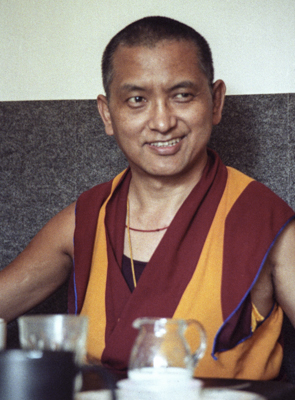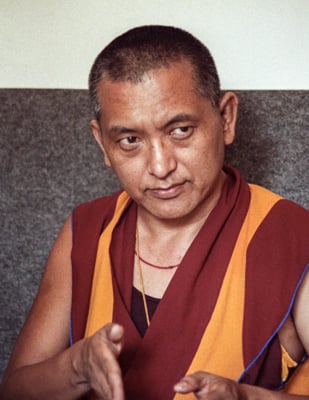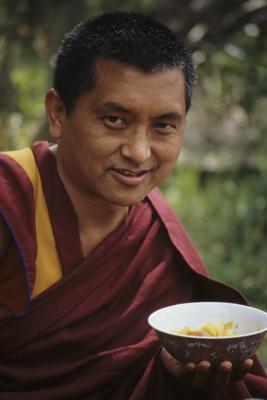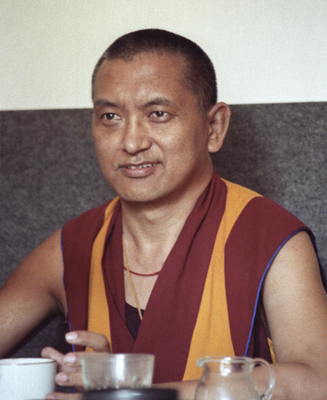Mind training in bodhicitta, which is the root of the Mahayana path to achieve enlightenment, has two methods. The first method is mind training in bodhicitta through the seven points of Mahayana cause and effect, that has been passed from Guru Shakyamuni Buddha to Maitreya Buddha, Asanga, and then to the pandits. The second method is the mind training equalizing and exchanging ourselves and others.
With the first method, by meditating and realizing how every sentient being has been our own mother and has been kind to us from beginningless time, we generate the thought of loving kindness towards all mother sentient beings, by thinking how they are devoid of happiness. We not only wish for all sentient beings to have happiness, but we also wish to bring this happiness to all sentient beings by generating the realization of great loving kindness.
When we think about the suffering of kind mother sentient beings, we should not only wish for them to be free from suffering. We should not wish that somebody else, such as the buddhas, bodhisattvas or other holy beings would help them be free from suffering. Great compassion and loving kindness is not like that—sitting comfortably, enjoying our life, completely relaxed, and then wishing that sentient beings are free from suffering. If we think, “How wonderful if they had happiness,” and then we are completely relaxed and lie down and sleep—we don’t do it that way!
 In everyday life, the responsibility that we take through our actions, through our actual work, is nothing other than obtaining happiness for ourselves, it is nothing more than sacrificing our life in service of the selfish mind. Day and night, we serve ourselves with our body, speech and mind—our selfish mind—and nothing else. We think, “If I’m happy, then it’s okay, it doesn’t matter about others. If I’m suffering, that is very bad. If I have problems, that is terrible, that’s very bad. If I can be happy, then that’s very good, that is the best thing.”
In everyday life, the responsibility that we take through our actions, through our actual work, is nothing other than obtaining happiness for ourselves, it is nothing more than sacrificing our life in service of the selfish mind. Day and night, we serve ourselves with our body, speech and mind—our selfish mind—and nothing else. We think, “If I’m happy, then it’s okay, it doesn’t matter about others. If I’m suffering, that is very bad. If I have problems, that is terrible, that’s very bad. If I can be happy, then that’s very good, that is the best thing.”
Instead of thinking that if others have success and happiness, then this is the best—instead of thinking that way and working for that, serving that, we think, “If I’m happy, that’s the best, I will succeed in my wish. If I do not have the happiness that I am looking for, if it doesn’t happen, if I fail, if I’m miserable, that’s the worst thing.”
As long as we have this attitude and we do not change— as long as we lead our life with this attitude, concerned only with ourselves, there is no happiness in our life. There is no peace of mind if that is our attitude and our main aim, day and night, and if we think that others don’t matter—however much they have problems and lack of success, and whether they are happy or unhappy.
It is said in the Guru Puja, the teaching on the guru yoga practice, the guru offering:
"There is no difference between myself and others:
None of us wishes even the slightest of sufferings
Nor is ever content with the happiness we have.
Realizing this, I seek your blessings that I may
Enhance the bliss and joy of others."
This is saying that from beginningless rebirths we have followed the selfish attitude, thinking, “It’s better if I’m happy, rather than others being happy.” So, we are constantly only thinking about our own problems, concerned with eliminating our own suffering and obtaining happiness only for ourselves. Therefore, from beginningless rebirths until now, we are still not free from the problems we have been experiencing over and over again— all the samsaric problems, all the sufferings, over and over, again and again. Still they don’t end—still we don’t reach the end—still we don’t finish experiencing the problems.
Therefore, the main mistake we have been making, the root mistake, is following the self-cherishing thought—renouncing others and cherishing ourselves.
So now we see why we have constant problems in our life—day-to-day, month-to-month, year-to-year, life-to-life. Why? Now we can see that all this failure—the lack of success and the undesirable things—came from our wrong attitude and mistaken thoughts. So therefore, from now on, from this minute, we must change our attitude from the self-cherishing thought that is the root of all failure—the undesirable things, depression, all the bad things. We must change from that to bodhicitta, the thought of cherishing others, which is the root of all happiness and success, the root from which we receive all benefits. The self-cherishing thought is the root from which we receive all harm.
So in this way, by changing our attitude, right this minute, we can obtain all the happiness for every sentient being. We can fulfill the wishes of all sentient beings, and lead everyone to the peerless happiness of enlightenment.
 Therefore, from now on, we should rejoice if others are successful. Between ourselves and others, if others are successful, we prefer that. Between ourselves and others, others should be happy, so happy. If others get the profit, we are happier.
Therefore, from now on, we should rejoice if others are successful. Between ourselves and others, if others are successful, we prefer that. Between ourselves and others, others should be happy, so happy. If others get the profit, we are happier.
Instead of others experiencing problems, loss and undesirable things, we experience this on their behalf. If there’s a choice between ourselves and others, we experience the problems and the suffering, and we dedicate and give our happiness to others, instead of taking the happiness for ourselves and giving the loss and the problems to others.
So then, we request the merit field to bless our mind to be able to do this, to be able to change our attitude in this way, to be able to act and live our lives in this way.
My thoughts are getting a little bit mixed with the other bodhicitta training. But the main point that I am trying to tell you is that Mahayana great compassion is not about filling our stomach up with delicious food and then lying down on a soft, comfortable bed, relaxing and wishing for others to be free from suffering and to have happiness. This is not Mahayana great loving kindness or great compassion. Great compassion is when we are the cause for all the sentient beings to be free from all the sufferings.
After that, we must generate the realization, the special brave attitude, thinking “I will work to free all sentient beings from all suffering and the whole cause, the obscurations, and to bring all the happiness, which includes the peerless happiness of enlightenment, by myself alone.” We take the whole responsibility of the work for other sentient beings upon ourselves. This is what is called the thought seeking the work for other sentient beings. Bodhicitta, the thought seeking enlightenment for sentient beings, comes after generating this attitude.
The second method for mind training in bodhicitta is equalizing and exchanging ourselves for others. Here, we meditate on the extensive kindness of other sentient beings, by exchanging ourselves for others and by realizing the shortcomings of the self-cherishing thought and the benefits of cherishing others. In the first bodhicitta meditation, there is only one part about kindness—that sentient beings are our mother and are kind, but in the second meditation we think about their extensive kindness in this life and other lives, when sentient beings are not our mothers in that particular life. The second meditation includes repaying the kindness and generating the realization of great loving kindness and great compassion, and the special brave attitude. The second bodhicitta method shows how to exchange ourselves for others, by realizing the shortcomings of the self-cherishing thought and the benefits of cherishing others.
Before doing the mind training in bodhicitta, exchanging ourselves for others, we need to lay the foundation—equalizing ourselves and others. Here, the equilibrium meditation that comes before exchanging ourselves for others, is great equanimity. There is also an equilibrium meditation realizing that sentient beings are our mothers and kind, that comes before mind training. So, there are differences like this. We wish for sentient beings to be free from anger and attachment, and to be free from discriminating against some sentient beings as distant and some as close, through anger and attachment.
So, wishing for sentient beings to be free from anger and attachment, and free from discriminating some sentient beings as distant and some as close, we realize the mistake in thinking how the problem comes from other sentient beings. The mistake is in having anger and attachment, and discriminating against some sentient beings as distant and some sentient beings as close. The mistake is this, and that is why we have problems in our lives. The problems are not only in our day-to-day life problems, but in life-to-life. In other words, we make mistakes in our way of thinking in everyday life.
This wish is the immeasurable equanimity that is the foundation of the seven points of Mahayana cause and effect. This equanimity cuts off our own attachment and anger—our attachment that discriminates some sentient beings as being close to us, and our anger that discriminates some sentient beings as being far away. We must cut off these discriminating thoughts of anger and attachment. The equanimity of this method of mind training in bodhicitta, the seven points of Mahayana cause and effect, is just this. This equanimity is general or common equanimity—it is not a special, particular Mahayana thought transformation practice. This training in equanimity is also practiced in Theravada and is revealed in the teaching of the Individual Vehicle path.
































